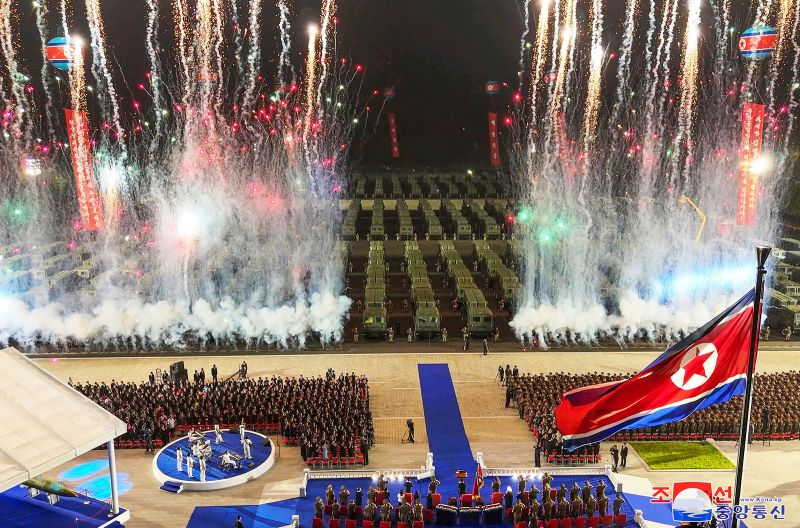
North Korea claims it’s sending 250 new missile launchers toward the South Korean border
North Korea claims it is sending 250 new tactical ballistic missile launchers toward its border with South Korea, in the latest bellicose declaration by leader Kim Jong Un against its neighbor.
Photographs published by the North Korean state newspaper Rodong Sinmun showed what appears to be vehicle-based missile launchers, with dozens of large green military trucks lined up in neat rows before Kim.
In an elaborate and orchestrated ceremony on Sunday night, a crowd of spectators cheered as vehicles rolled past and fireworks shot into the sky.
Kim personally oversaw the transfer of equipment to military commanders and chiefs of staff, and delivered a speech claiming the new missile launchers were built with North Korean technology, state media reported.
He added that the display is the first stage of planned missile force construction for the North’s military border units.
“Dialogue or confrontation can be our choice, but what we must be more thoroughly prepared for is confrontation,” Kim said, adding it was the “keynote of our policy toward the US that we have consistently maintained.”
North Korea will make it clear that “if the US ignores our repeated warnings and continues to attempt to undermine the security of the region, it will have dire consequences for its own security,” the dictator added.
What we know about North Korea’s abilities
The border between North and South Korea is already one of the most militarized in the world, and Pyongyang has long claimed that it has huge amounts of artillery and military hardware pointed south.
Sunday’s display in Pyongyang comes during a summer of heightened tensions on the Korean Peninsula, with North Korea entering into a new military “strategic partnership” with Russia in June.
While the photos appear to show dozens of green transporter-erector launcher vehicles, and trucks equipped with missile launchers positioned behind the driver’s cab, it’s unclear if any of the vehicles had functioning missiles during Sunday’s event.
Joseph Dempsey, research associate for defense and military analysis at the International Institute for Strategic Studies, said on Monday it was difficult to assess if any of the missiles were loaded at the ceremony – but “it would seem unlikely and illogical based on practicality and safety.”
He added that the launcher’s design and terminology is “associated with the Hwasong-11D, a short-range ballistic missile which North Korea claims can be armed with a tactical nuclear warhead.”
“Assuming all 250 launchers are functional it’s unclear if North Korea has produced the corresponding capacity of 1,000 missiles (and beyond),” he added. “It’s highly improbable at least that North Korea has anywhere near that number of tactical nuclear warheads.”
Since conducting its first nuclear test more than a decade ago, North Korea has advanced its weapons capabilities, with the ambition of miniaturizing a warhead so that it can fit on a long-range missile.
Experts say North Korea has likely already manufactured a small stockpile of nuclear warheads – but it remains unproven whether it has been able to make them small and light enough to be fitted on a missile.
North Korea’s ability to deploy a nuclear warhead on any kind of missile is unproven.
Rising tensions
Pyongyang had warned late last year that it would deploy new military hardware along the military demarcation line that separates it from the South, after Seoul partially pulled back from a 2018 agreement designed to ease tensions along the border.
But any goodwill generated by the agreement has evaporated in recent years, and both countries have now officially abandoned it.
Kim, who did not get the concessions he wanted from the US and South Korea during subsequent talks after 2018, has since ramped up the North’s ballistic missile program, pledging to give Pyongyang a nuclear deterrent like that possessed by Washington.
In response to the North Korean buildup, the US and South Korea – along with Japan – have stepped up their military cooperation via exercises and deployments that Pyongyang sees as a threat.
There have been at least three incidents of South Korea firing warning shots since May after North Korean military personnel crossed the demarcation line, the midpoint of the Demilitarized Zone between the two countries.
